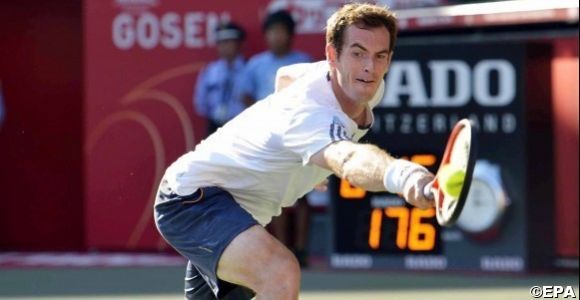Murray Encourages Increased Blood Testing
 Murray Encourages Increased Blood Testing
Murray Encourages Increased Blood Testingepa03422088 Andy Murray of Britain returns the ball to Stanislas Wawrinka of Switzerland during their quarter final match of the Rakuten Japan Open Tennis Championships tournament in Tokyo, Japan, 05 October 2012. Murray won 6-2, 3-6 and 6-2. EPA/TOMOYUKI KAYA |
Previously Andy Murray has always criticized the intrusion drug testers make into his life, ringing on his door bell at 6am in the morning. However in the wake of the Lance Armstrong crisis that has rocked not just cycling but world sports, the Scot has has called upon tennis to introduce more blood tests and more out-of-competition testing in order to prevent the sport from suffering a similar doping scandal.
Murray revealed he had been blood tested on Saturday, just after arriving in Paris to contest the BNP Paribas Masters, where he and Novak Djokovic are the main attractions following the withdrawals of Roger Federer and Rafael Nadal.
In the circumstances, Murray said he didn’t mind but maintained the way to catch cheats is to test them when they are training away from competitions.
“We get tested throughout the whole year from a lot of the tournaments [but] I think the out-of-competition stuff could get better,” said the Scot who last week opted out of playing the Swiss Indoors in Basel because of back pain. “When we’re in December, when people are training and setting their bases I think it would be good to try and do more around that time.”
Under the World Anti-Doping Agency code, all singles players ranked among the world’s top 50 must declare their whereabouts for one hour, every day for three months in advance. Drug testers can come at any time but if a player misses three tests over 18 months (during that one-hour window), then that individual would be subject to a ban.
Murray is mindful of other doping issues in tennis that have affected lower ranked players, such as the Wayne Odesnik case when the South African born player was caught importing human growth hormone into Australia in 2010, or Filippo Volandri’s issues when the Italian was banned for three months after failing test for salbutamol in 2008, but reinstated after Court of Arbitration for Sport lifted his suspension on appeal. Murray now thinks testing should be carried out on believes the rest of the tour.
“There’s a lot of testing at the top end but lower down there isn’t anywhere near as much,” said the Scot. “I think that only the top-50 singles players and the top-10 doubles players have to do it. You need to do it throughout the whole sport.”
But Murray believes tennis was in a much healthier position than cycling. “I think there’s very little skill involved in the Tour de France, it’s pretty much just physical,” he said. “A lot of the way the teams work now is just science whereas with tennis, you can’t teach the skill by taking a drug.
“Virtually the whole of the Tour de France was taking drugs ten years ago and in tennis since 1990 [tennis] has had [around] 65 positive tests, tenof them recreational and 30 to 35 performance-enhancing in that time. In one year of the Tour de France you had more than that so I don’t think tennis has been that bad. But that isn’t to say that more can’t be done to make it 100% sure there are no issues.”


10sBalls Top Stories
- Bahis Sitelerinin Deneme Bonusu Kullanım Şartları
- Deneme Bonusları ile Ücretsiz Bahis Nasıl Yapılır?
- Cazip Hoş Geldin Bonusları ile Üyelik Avantajları
- Bahis Siteleri ve İlk Üyelik Bonusu Detayları
- Yeni Üyeler İçin En Cazip Bahis Bonusu
- Deneme Bonusları İle Eğlenceli Oyun Deneyimleri
- Güvenilir Bahis Siteleri: Bonus ve Güvenlik İncelemesi
- Reasons Behind the Increase in Sex Shops
- Reasons Behind the Increase in Sex Shops
- Reasons Behind the Increase in Sex Shops
- Casibom: Yaşayan Casinolar ve Bahisler Lider Platform
- Sea Star Casino: Play Games Without Registering Online
- JETZT DEN SWEET BONANZA SLOT GRATIS DREHEN
- Азартные игры с Мостбет Казино – испытайте удачу
- Çevrimiçi en iyi yuvalar: Hizmetinizde Karavan Bet Casino




